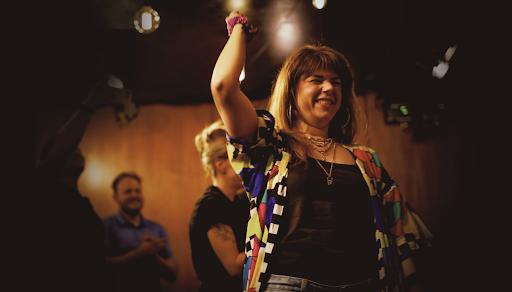The Improv Class that Rewired my Nervous System
Maggie Schwenn takes the stage at Jackalope Theater | Image courtesy of Jackalope Theater
You wouldn’t know it from the outside, but underneath a weed dispensary in Tulsa, OK, something radical is happening. Nestled in the basement, sits the Jackalope Theater. There’s no big marquee, and if you didn’t know what you were looking for, you’d probably miss it. But if you follow the sound of eruptive and uncontained laughter, you’ll land in a room where adults are playing pretend.
This is improv class
The improv (short for improvisation) we practice at Jackalope isn’t just for laughs. It’s not the glitzy, fast-talking kind you grew up watching on Whose Line Is It Anyway? Not the career-track Second City pipeline where performers claw toward an SNL audition.
This version is messier. Stranger. More honest. Less concerned with punchlines and more interested in what happens when people stop performing and start responding. It is, in short, a room full of grown-ups learning how to be present again.
Improv’s modern DNA comes from Viola Spolin, a social worker in 1940s Chicago who used theater games to help immigrant kids navigate language, culture and find creative freedom through structured play. Nearly a century later, those same games still form the skeleton of modern improv training today—just with more adults who’ve forgotten how to play.
Permission to Make Mistakes
I didn’t sign up for improv because I wanted to be funny. I signed up because I was tired of being frozen. I wanted to get out of my head and into a room of people where I didn’t have to be anyone other than myself.
Improv gave me both.
Each class felt like a low-stakes rehearsal for real life. If I messed up, I kept going. If I missed the cue, I made up a new one. If I said something weird or completely flat, I said it with conviction and trusted my scene partner to meet me wherever I landed. There was no time to self-edit, no space to retreat into overthinking.
And that muscle, the one where I laughed at myself instead of shaming myself, turned out to be one I didn’t know I needed to build. The social change was evident. Outside of improv, I became less rigid in conversations, less afraid of saying the wrong thing. I stopped over-explaining. I stopped apologizing for being too much. I started trusting that I could show up in real time, with real people and not fall apart if something got awkward.
Joy Isn’t Just a Feeling, It’s a Skill
Improv, for all its absurdity, is demanding work.
Improv trains your nervous system to tolerate uncertainty. It teaches you how to listen with your whole body and how to hold space for tension without needing to resolve it immediately. And it teaches you how to play again.
There aren’t many spaces where adults are invited—let alone encouraged—to play like this.
We live in a culture that associates adult value with productivity. Even hobbies are supposed to lead somewhere: a side hustle, a brand, a measurable skill. But improv resists all that. The success isn’t in the product—it’s in the process.
I left class each week mentally stretched and emotionally softened, like I’d done yoga for my personality. I laughed hard, connected deeply and let go of whatever scripts I’d walked in with.
I didn’t even realize how rare that feeling had become outside of meditation until I had it with a group of people that were playing together. Improv is definitely an important part of my self-care routine, just as important as stretching, meditating and hydrating.
Everyone in class comes in with a reason. Some people want to practice speaking louder. Others are trying to work through their grief, boredom or burnout. Some want to be funnier; some just step away from the stresses of life . But by the end of class, those reasons dissolve. You’re just there, with people, learning how to soften, be present and trust the moment.
Nothing is recorded. Nothing is posted. Nothing is saved.
There’s something deeply human about building something together that disappears as soon as it’s made. You just show up, offer what you have and build on whatever comes next. You just have to say: “yes—and...”
Jackalope Theater offers classes for adults in Tulsa, OK. Learn more at www.jackalopetheater.com or follow their instagram for news and updates.

